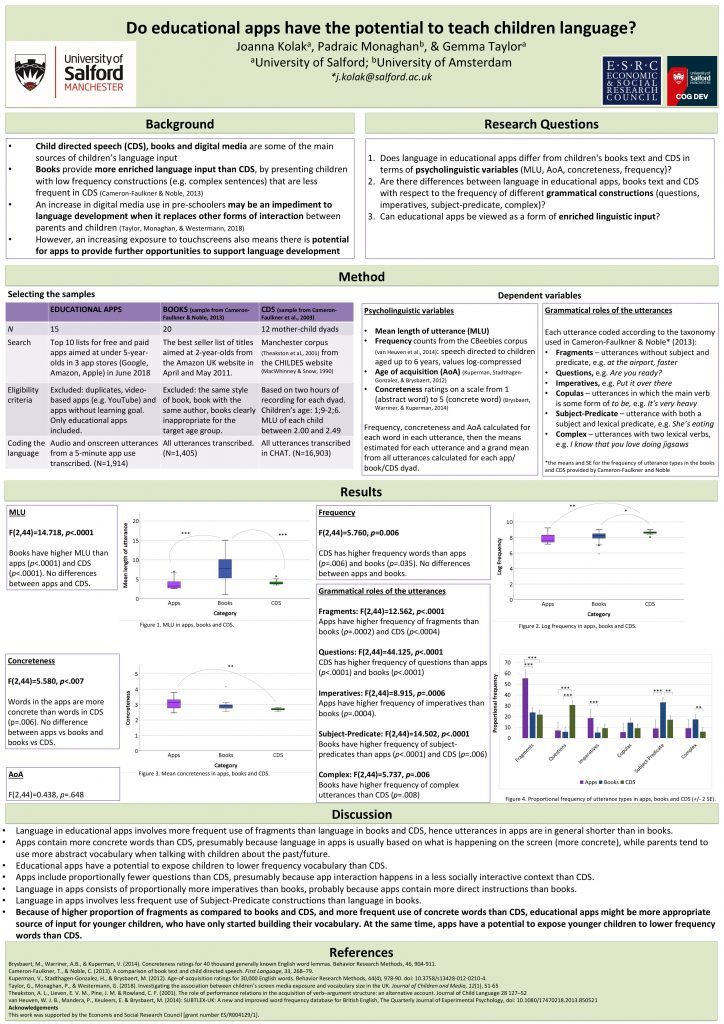In the new episode of our podcast Joanna Kolak talks to Dr Katie Twomey, a lecturer from the University of Manchester and an expert in language and cognitive development. Katie explains how children’s learning is driven by curiosity, based on various experiments to date with infants and toddlers. Can children’s curiosity prompt their word learning? How can we help children explore the world around them? Listen to the podcast to find out!
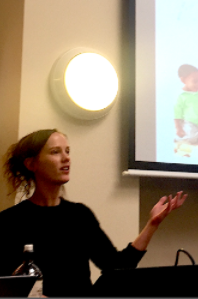
from the University of Manchester
Here are some of the papers that Katie mentioned during our conversation:
How do you learn to walk? Thousands of steps and dozens of falls per day.
Hi Everyone! We hope you enjoyed the previous episodes of our podcast. Today we present a new episode in which Dr Gemma Taylor talks to Dr Jamie Lingwood, a Developmental Psychologist specialising in child’s language development and an alumni member of the Leeds Child Development Unit.
Jamie was telling us about his research in which he explored how shared book reading fosters language development. Are you interested in finding out what are the benefits of shared book reading for child’s language development? Should caregivers label objects/characters in the book when reading to young children or should they rather carry on with the story? Is it ok to read the same book to children over and over again if they ask for it? Listen to the podcast and find out!

Here are some resources that Jamie mentioned during the conversation:
http://lucid.ac.uk/media/1885/eb_shared_reading_rowland-et-al.pdf
https://www.bbc.co.uk/tiny-happy-people/sounds-at-storytime/zbpk92p
In today’s podcast Joanna Kolak, researcher from our lab, talks to Professor Angelo Cangelosi form the University of Manchester. Angelo is an expert in language grounding and embodiment in humanoid robots, developmental robotics and human-robot interaction. In the podcast he explains what developmental robotics is and how it combines research on child development with studies on robots behaviour. He also discusses how robots learn who to trust and what impact can studies on human-robot interactions have on our life.

from the University of Manchester
Here are the articles and projects mentioned in the podcast:
Would a robot trust you? Developmental robotics model of trust and theory of mind.
Posture affects how robots and infants map words to objects.
e-LADDA research project – Early Language Development in the Digital Age
In today’s podcast Dr Gemma Taylor, who runs our lab, talks to Dr Amy Bidgood, a lecturer in Developmental Psychology at the University of Salford. Amy is an expert in child language development and was telling us about how children learn their first words and how best to support their language development.
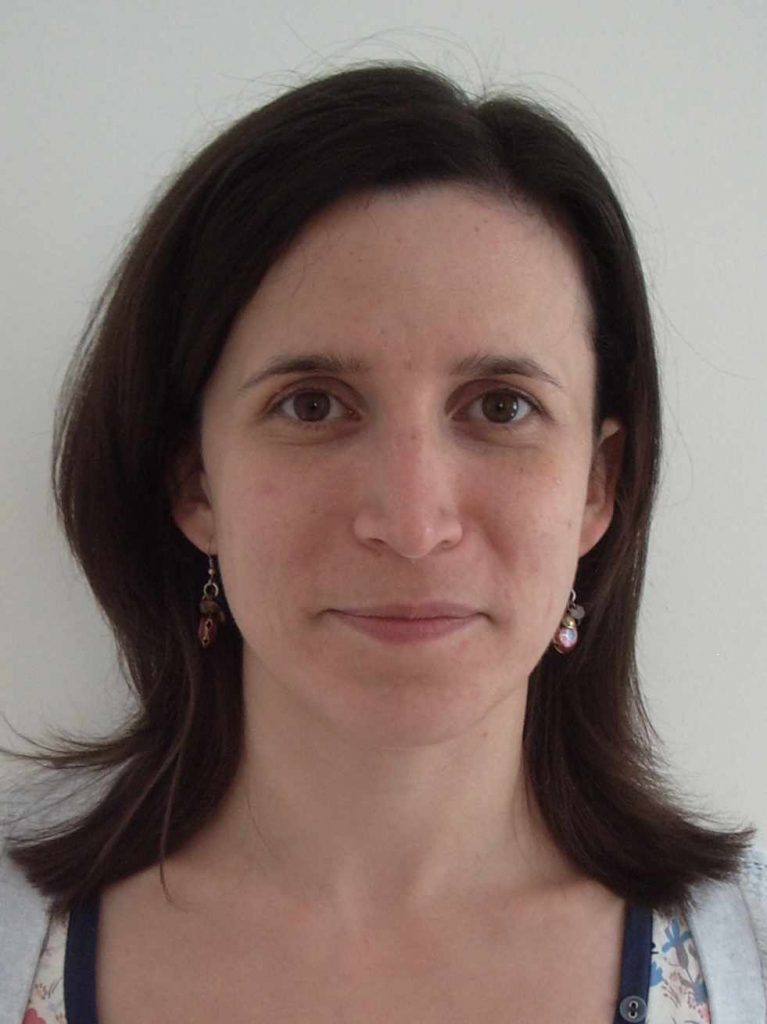
Here are the links for the research that Amy discussed today:
Does speed of processing or vocabulary size predict later language growth in toddlers?
Here’s an accompanying blog post for the paper http://lucid.ac.uk/news-events-blog/blogs/does-speed-of-processing-or-vocabulary-size-predict-later-language-growth-in-toddlers/
Communication in nature by Cameron-Faulkner et al., 2018
Contingent talk intervention by McGillion et al. 2017
The websites Amy mentioned are:
https://www.bbc.co.uk/tiny-happy-people
https://www.thecommunicationtrust.org.uk/
Do you have any questions or comments about the podcast? We would love to hear from you!
In today’s podcast, Joanna Kolak, researcher from our lab, talks to Dr Daniela Ghio – lecturer from the University of Salford and a Charted Psychologist with interests in digital health across the lifespan and paediatric psychology. Based on the research she was involved in, Daniela tells us about how best to support children and young people in dealing with long-term conditions, such as juvenile idiopathic arthritis and eczema.
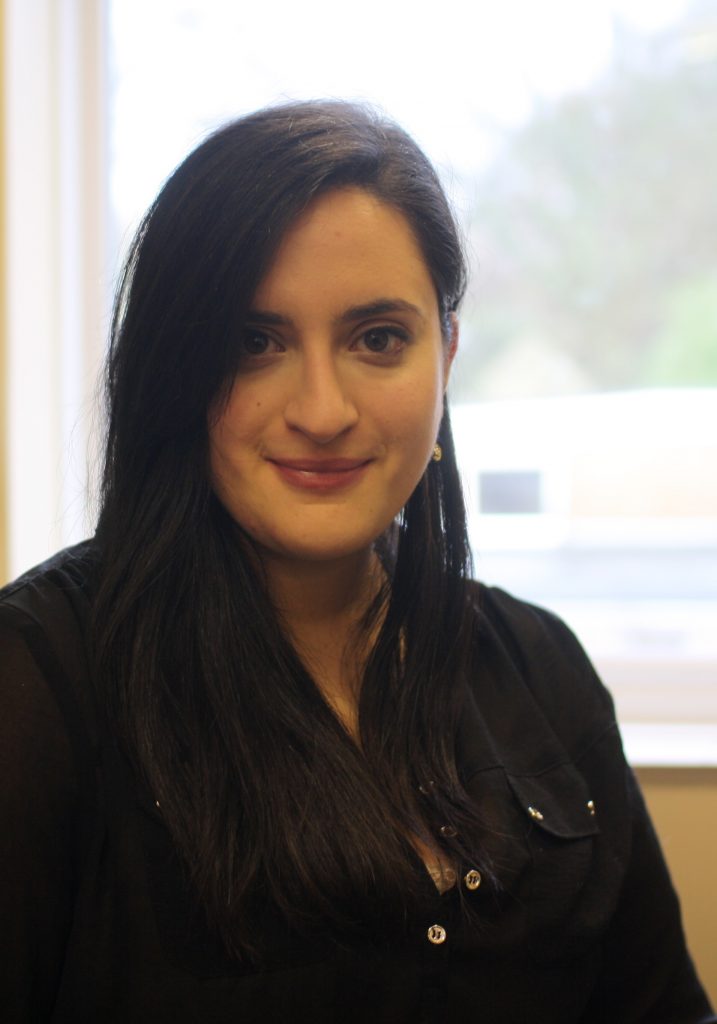
Background to the interview:
The research in this podcast were part of bigger projects, research with adolescents with Juvenile Idiopathic Arthritis was supported by National Institute for Health Research (NIHR) Biomedical Research Unit Funding Scheme and the NIHR Manchester Biomedical Research Centre. Aspects of this work were also supported by Arthritis Research UK, including funding for Centre for Epidemiology Versus Arthritis (grant 20380).
The research with children and young people with eczema was supported by the NIHR under its Programme Grants for Applied Research programme (grant ref No RP-PG-0216-20007). Eczema Care Online (ECO) was developed using LifeGuide software, which was partly funded by the NIHR Southampton Biomedical Research Centre (BRC). For more information about the Eczema Care Online Project: https://www.nottingham.ac.uk/eco/ or follow on Twitter @ECO_Eczema
For more information about using the Person Based Approach: https://www.lifeguideonline.org/pba
Research describing developing and testing a complex intervention targeting both healthcare professionals and older patients in primary care is funded from an NIHR Programme Grant for Applied Research, Reference Number RP-PG-0614-20004.
The views expressed are those of the speaker and not necessarily those of the NHS, the NIHR or the Department of Health and Social Care and has no conflicts of interest to declare.
Resources mentioned in this podcast:
Papers referred to in the podcast for further reading:
Ghio, D., Greenwell, K., Muller, I., Roberts, A., McNiven, A., & Santer, M. (in press) Psychosocial needs of adolescents and young adults with eczema: A secondary analysis of qualitative data to inform a behaviour change intervention. British Journal of Health Psychology DOI: 10.1111/bjhp.12467
Ghio, D., Muller, I., Greenwell, K., Roberts, A., McNiven, A., Langan, S. M., & Santer, M. (2019). “It’s like the bad guy in a movie who just doesn’t die”: A qualitative exploration of young people’s adaptation to eczema and implications for self-care. British Journal of Dermatology. DOI: 10.1111/bjd.18046
Ghio, D., Thomson, W., Calam, R., Ulph, F., & Baildam, E. M. (2018). The prioritization of symptom beliefs over illness beliefs: the development and validation of the Pain Perception Questionnaire for Young People. British Journal of Health Psychology, 23(1), 68-87. DOI: 10.1111/bjhp.12275
We are pleased to introduce the Salford Cognitive Development Lab’s podcast – a mini series where we talk to academic experts to take a closer look at some of the most recent research on child development.
In the first episode of our podcast Dr Gemma Taylor who runs our lab talks to Dr Greg Keenan, lecturer from the University of Salford, about child eating behaviours. The main focus of this conversation is on discussing the findings from the paper published recently in Child Developmental Perspectives, titled ‘Feeding During Infancy: Interpersonal Behavior, Physiology, and Obesity Risk‘.
We hope you enjoy it! If there are any particular topics that you would love to hear about in our podcast, leave us a comment. You can expect new episodes of our podcast every week.

expert in eating behaviours
On the 12th July we had a pleasure to present our poster at Child Language Symposium in Sheffield. In our study we discussed the differences between language used in the most popular educational apps, the best seller books aimed at 2-year-olds and in language directed to children by their parents. See the attached poster to learn what we’ve found!

My name is Shenitta and I am a 1st year Undergraduate Single Honours Psychology student at the University of Salford.
From observing the diverse and multicultural society, I have developed an interest in mental health disorders and how environmental factors such as nutrition can affect gene sequences and hormones which can result in a change in mental health. To further my interests in the field of mental health disorders I previously volunteered for the Young Adults Services and Projects (YASP) my main role as a mental health mentor was to increase people’s well-being and set appropriate goals in order to improve their mental health.
I have worked alongside multiple research projects such as Manchester’s Psychology Research Team for one of the top Russel group universities in the United Kingdom. Also, as a Member of the Young People’s Advisory Group in Healthcare research in order to increase young people’s interests in developing research. During this role I reviewed applications for research whilst considering possible research areas relevant to young people’s development.
Whilst attending Sixth form college where I studied A level Biology, Sociology and Psychology I became aware of the problems within academia with regards to ethnic minority parents and children’s issues faced in the Education system. I was delighted to be a part of the Parent’s Pupil’s Educational Network which was funded by a local Russell group university. My role as a member involved contacting the local council if parents had any issues with school places whilst offering support to parents on issues about discrimination of their children, vaccinations and bullying schemes.
I then developed an interest in analysing how ethnic minority children develop and how bilingual students are affected during their educational success. I became a Saturday School Maths teacher to ethnic minority primary school students.
As a Research Assistant at the University of Salford Cognitive Development Lab and an aspiring Clinical Psychiatrist I aim to provide research experience whilst understanding the impact digital media has on children’s development. I assist with testing children in the lab using eye tracker and I help with data coding for the eye tracker study. I also help with the transcriptions of the language from children’s books.
Our Research Assistant Joanna Kolak has attended the Digital Media and Developing Minds Congress in New York in October 2018 and presented a poster titled “Understanding the educational potential of touchscreen apps targeting 2-5 year old children”. The poster shows preliminary results of the first study of our ESRC funded project. Have a look at the poster to see which features used in children’s apps may capture children’s attention and facilitate learning.
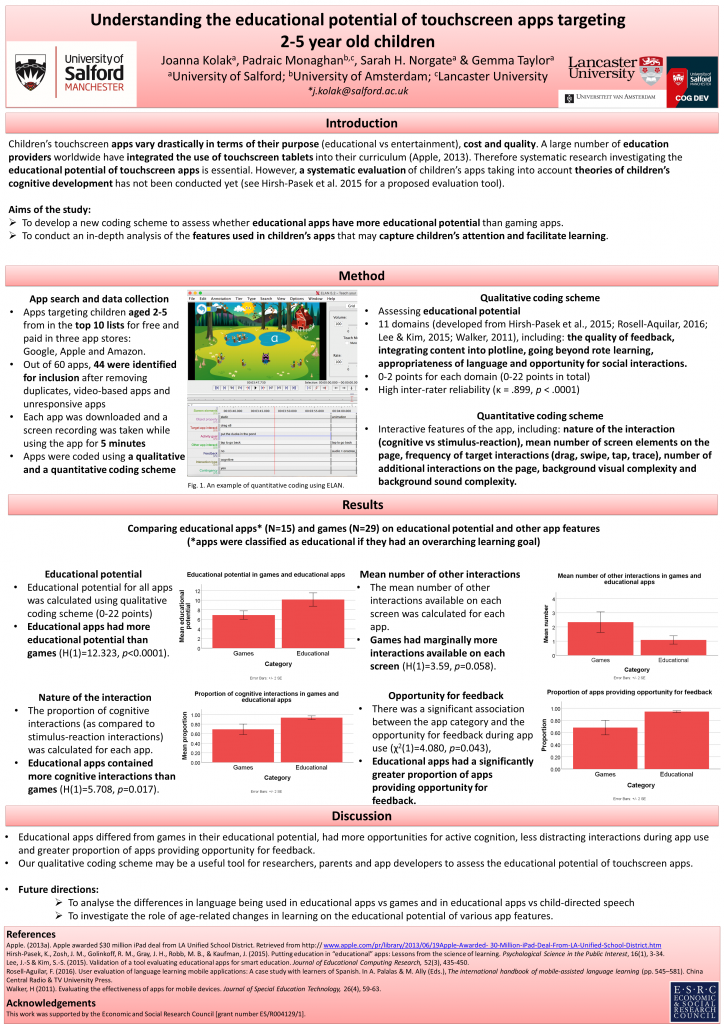
“My son loved taking part in the study at Salford Cognitive Development lab. It was a fun and interactive experience and we’re looking forward to a return visit”
-Parvinder, mum of a 2 year old boy
The burgeoning choice of children’s apps available to download can feel a little bewildering. So how can you tell if an app or a game that tries to be educational, really does have some educational potential?
The App market offers parents and children a wide range of apps and games to choose from. Many apps for young children are labelled as ‘educational’ but so far there has been no research that could determine whether they are actually effective in teaching children. Parents have little time to scope advice on what to buy or download from the internet. Unfortunately, there is minimal professional guidance about what is educational and what is not.
In our study carried out in the Cognitive Development lab at the University of Salford we are exploring how children aged 2 – 4 years learn language from educational touchscreen apps. We ask children to wear special glasses tracking their eye movement and we are looking at children’s attention during tablet use – what are they focusing at on the screen when they are using an app on the tablet and what can it tell us about their word learning.
Our research will help to identify whether touchscreen apps can benefit children’s learning. We want to help parents make better choices for their children’s use of digital media. Our 3-years research project is funded by the Economic and Social Research Council (ESRC).
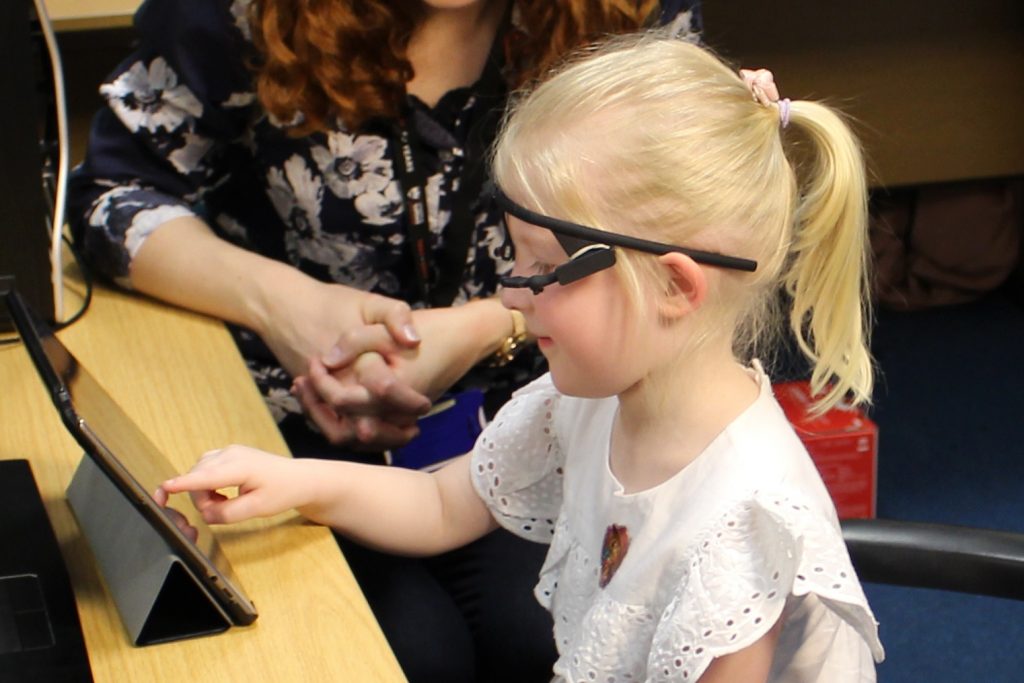
A visit in our lab is fun!
We invite parents and children to visit us in our lab and to take part in our fun games. Our lab is a colourful child-friendly room full of toys with some space for parents to enjoy a cup of tea or coffee while we tell them about the study. During a visit to our lab, children play on our specially designed word learning app and do some fun language based activities with us. The study takes approximately 45 minutes together with short breaks between the activities. Children who have visited us so far had lots of fun with our games!
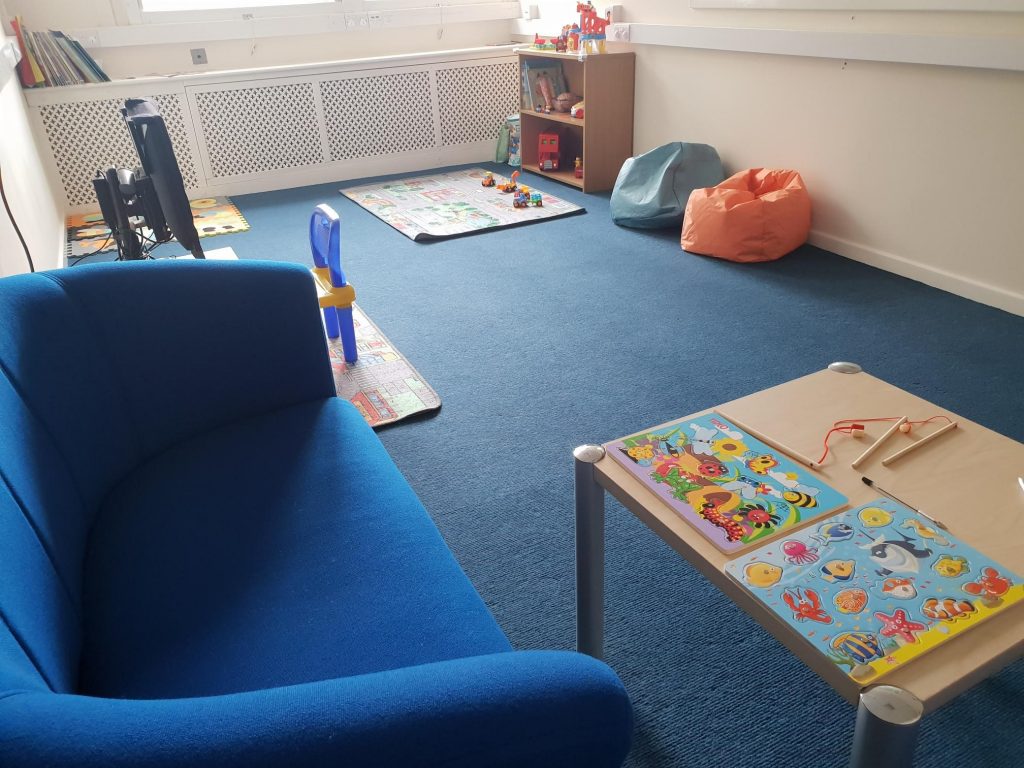
Parents whose children took part in our study had a very positive experience with us:
“Taking part in the study at Salford Cognitive Development lab was really good fun, my daughter especially liked all the lovely toys and interacting with Joanna, the Research Assistant, who was really good with her and quickly put her at ease. It was so interesting for me to watch and I was very impressed by how professionally the study was conducted. Would highly recommend, it’s a great opportunity to contribute to important research and for little ones to explore play in a different surrounding.”
-Kirstine, mum of a 2year old girl
If you have a child aged 2 – 4 and would like to visit us in the lab or get more information about the study, please get in touch:
